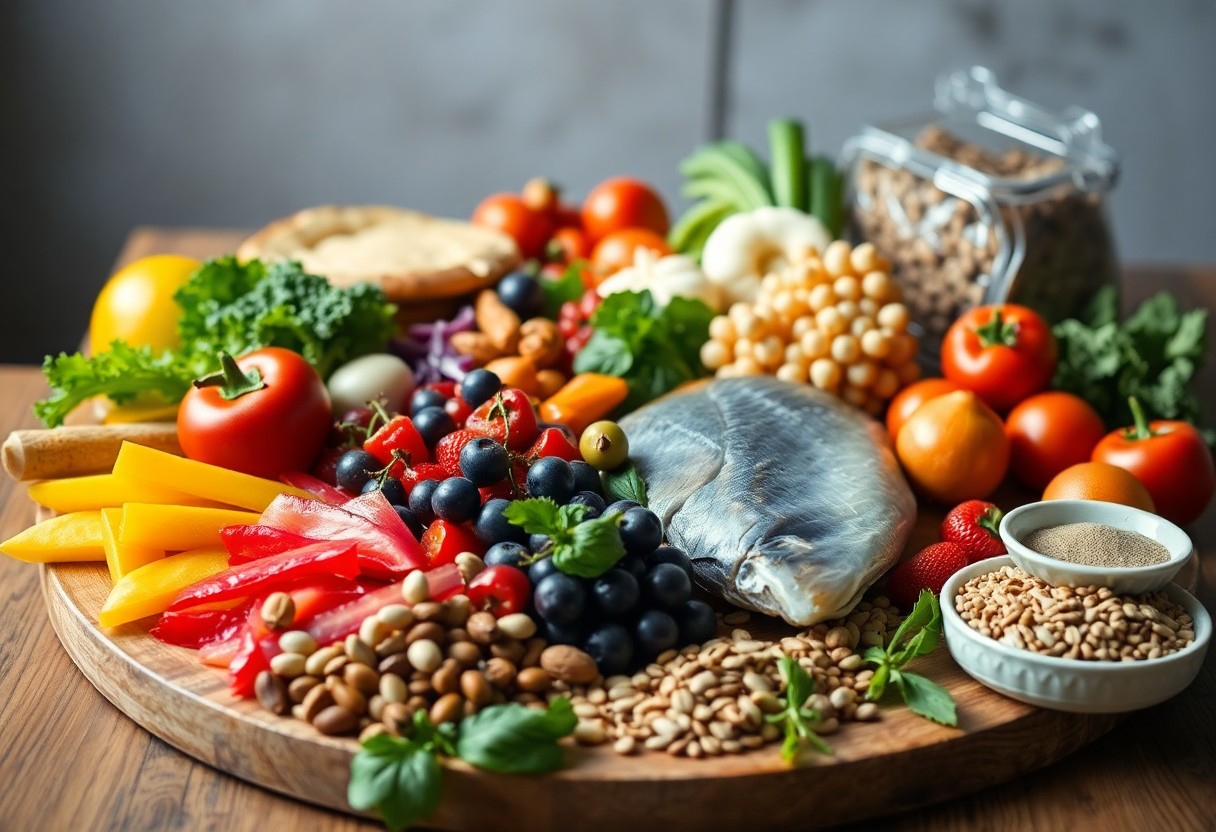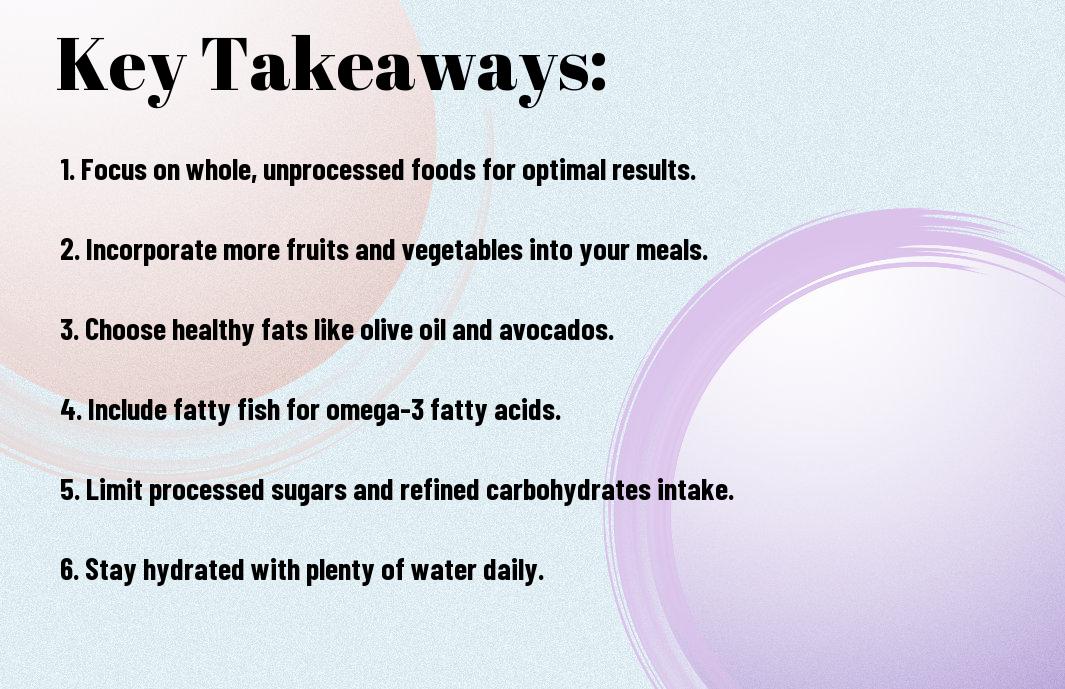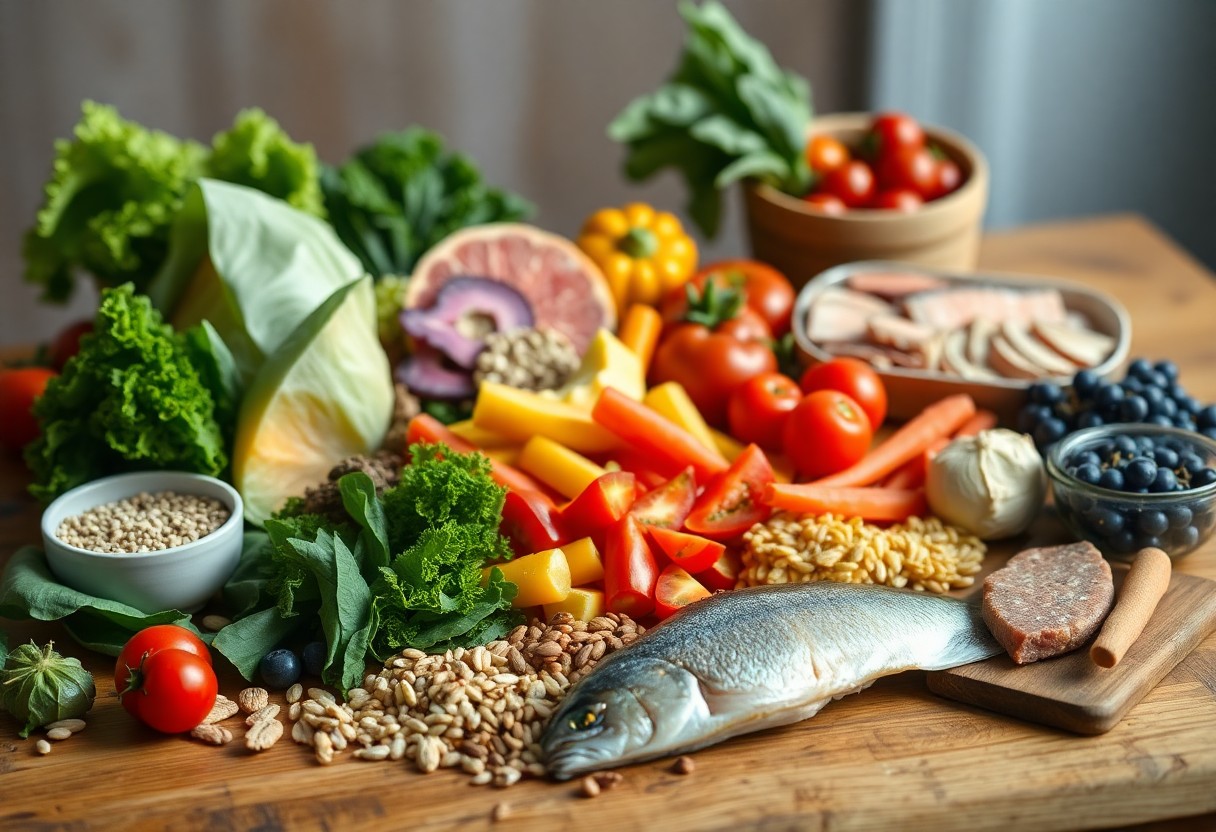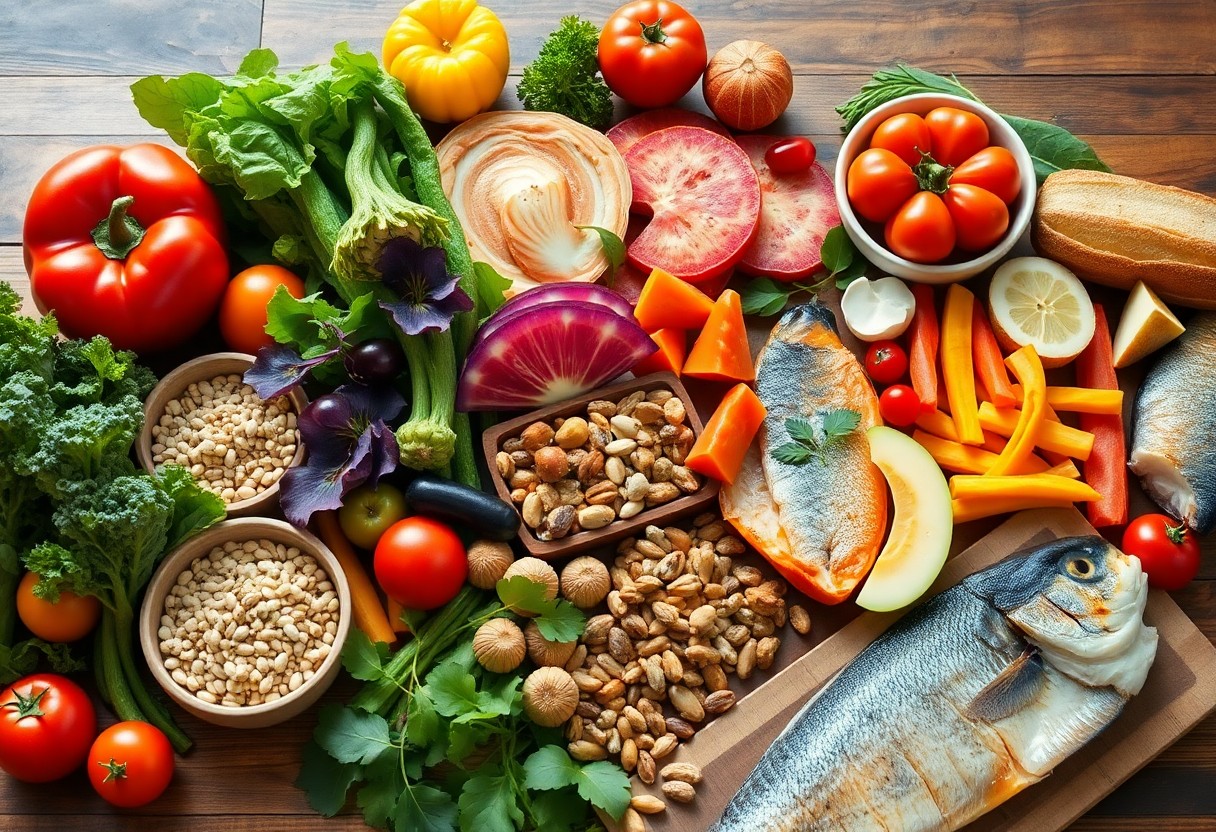As you consider your dietary options, chronic inflammation may be a major concern for your overall health. You may be aware that a poor diet can lead to severe health issues, such as heart disease and cancer. On the other hand, a well-planned diet can have powerful anti-inflammatory effects, helping you maintain a healthy weight, boost your energy, and even reduce your risk of disease. By making informed choices, you can take control of your diet and your health, starting with understanding the best diet for reducing inflammation.

Key Takeaways:
To reduce inflammation effectively, consider the following points:
- Focus on an anti-inflammatory diet that is rich in whole foods, such as fruits, vegetables, whole grains, and lean proteins, which help in minimizing the intake of pro-inflammatory substances.
- Incorporate fatty fish into your diet, as they are high in omega-3 fatty acids, which have potent anti-inflammatory properties that can help reduce inflammation in the body.
- Avoid or limit the consumption of processed foods and sugary drinks, as they can trigger inflammatory responses and exacerbate conditions associated with chronic inflammation.
- Stay hydrated by drinking plenty of water and consider incorporating herbal teas and other anti-inflammatory beverages into your daily routine to help reduce inflammation.
- Consider adopting a Mediterranean-style diet, which is high in healthy fats, such as those found in olive oil, and has been shown to have anti-inflammatory effects and promote overall wellness.

Causes of Inflammation
To understand the best diet for reducing inflammation, you need to know what causes it. Inflammation can be triggered by various factors, including chronic conditions and dietary factors.
Chronic Conditions
Around 25% of adults suffer from chronic conditions like arthritis, diabetes, and obesity, which can lead to inflammation. You may be at risk if you have a family history of these conditions.
Dietary Factors
Inflammation can be caused by unhealthy eating habits, such as consuming high amounts of sugar and processed foods. Some common dietary factors that contribute to inflammation include:
- Gluten
- Dairy
- Refined carbohydrates
After identifying these factors, you can start making changes to your diet to reduce inflammation.
This is especially important when it comes to dietary factors, as you have control over what you eat. Some foods can trigger inflammation, while others can help reduce it. Some common inflammatory Foods include:
- Fried foods
- Red meat
- Processed snacks
After making informed choices about your diet, you can take the first step towards reducing inflammation and improving your overall health, which can significantly reduce your risk of chronic diseases.
Anti-Inflammatory Diets
Some diets can help you reduce inflammation, and you can learn more about them at Eating to Reduce Inflammation – Whole Health Library. You will find information on how to make informed choices to manage inflammation.
Mediterranean Diet
For instance, the Mediterranean diet is known for its anti-inflammatory effects. You can benefit from incorporating healthy fats, whole grains, and fruits into your diet.
Plant-Based Diets
One of the most effective diets for reducing inflammation is a plant-based diet. You can expect to see a significant reduction in inflammatory markers when you focus on whole, unprocessed foods.
Mediterranean plant-based diets, in particular, offer numerous health benefits, including lower risk of chronic diseases. As you adopt this diet, you will notice a decrease in inflammation, which can lead to improved overall health. You should be aware that a well-planned plant-based diet can help you avoid nutrient deficiencies and ensure you get all the necessary vitamins and minerals. By making informed choices, you can harness the power of nutrition to manage inflammation and improve your overall well-being.
Foods to Eat
Once again, you can reduce inflammation by consuming the right foods. As you can learn more about it from this article: Can You Reduce Inflammation Through Your Diet?, a balanced diet is key to fighting inflammation.
Fatty Fish
By incorporating fatty fish into your diet, you can reduce inflammation and improve your overall health. Fatty fish like salmon and tuna are rich in omega-3 fatty acids, which have anti-inflammatory properties.
Leafy Greens
Fish aside, leafy greens like spinach and kale are also packed with antioxidants and other inflammatory-fighting compounds. You can add them to your meals to reduce chronic inflammation.
This helps you to make informed decisions about your diet and lifestyle, allowing you to take control of your inflammatory responses. As you continue to eat nutrient-dense foods like leafy greens, you will be better equipped to manage inflammation and improve your overall well-being.

Foods to Avoid
Unlike other diets, reducing inflammation requires you to be mindful of your food choices. You can find a Quick-start guide to an anti‑inflammation diet to help you get started.
Processed Meats
With a focus on reducing inflammation, you should limit your intake of processed meats like hot dogs and sausages, as they contain preservatives that can trigger inflammation in your body.
Refined Sugars
Around every corner, you’ll find foods filled with refined sugars, which can cause chronic inflammation and lead to various health problems.
Sugars, particularly added sugars, are hidden in many foods, including bread, pasta sauce, and even seemingly healthy options like yogurt. As you work to reduce inflammation, it’s important to be aware of your sugar intake and choose whole, unprocessed foods to help minimize your risk of developing serious health issues, such as diabetes and heart disease, and to maintain a healthy weight.

Lifestyle Changes
After implementing a diet for reducing inflammation, you should also consider lifestyle changes to enhance its effects. This can include stress reduction techniques, exercise routines, and getting enough sleep to help your body heal and reduce inflammation.
Stress Reduction
Alongside dietary changes, anxiety and stress management are vital for reducing inflammation. You can practice techniques like meditation or yoga to help reduce your stress levels and promote overall well-being.
Exercise Routine
Alterations to your daily routine, such as incorporating physical activity, can help reduce inflammation. You should aim to engage in moderate-intensity exercises, like walking or cycling, for at least 30 minutes a day to see positive effects.
Consequently, as you start your exercise routine, you will notice improvements in your overall health, including reduced inflammation and weight loss. You will be able to manage your stress levels more effectively, and your sleep quality will also improve, leading to a significant reduction in inflammation and a lower risk of developing chronic diseases.
Nutrition and Supplementation
Many of the foods you eat can either increase or decrease inflammation in your body. You can make informed choices to reduce inflammation through your diet and supplement routine, which can have a significant impact on your overall health.
Omega-3 Fatty Acids
For instance, consuming foods rich in omega-3 fatty acids can help reduce inflammation. You can find these healthy fats in fatty fish, flaxseeds, and walnuts, which can be incorporated into your daily meals to promote overall well-being.
Turmeric and Ginger
Against the backdrop of various anti-inflammatory spices, turmeric and ginger stand out for their potent properties. You can add them to your meals to harness their benefits, which can help alleviate inflammation and improve your health.
At the core of turmeric’s benefits is a compound called curcumin, which has powerful anti-inflammatory and antioxidant properties. By incorporating turmeric and ginger into your diet, you can potentially reduce the risk of chronic diseases and promote a healthier you, as these spices can help mitigate inflammation and improve your overall well-being, which is necessary for maintaining optimal health.
Final Words
With this in mind, you can now make informed decisions about your diet to reduce inflammation. You understand the importance of choosing the right foods to alleviate your symptoms. By incorporating anti-inflammatory foods into your diet and avoiding trigger foods, you can take control of your health. Your body will thank you, and you will be on your way to a healthier, happier you.
FAQ
Q: What is the relationship between diet and inflammation in the body?
A: The diet plays a significant role in managing inflammation within the body. Certain foods can trigger or reduce inflammation. A diet rich in whole, unprocessed foods such as fruits, vegetables, whole grains, lean proteins, and healthy fats can help in reducing inflammation. On the other hand, consuming high amounts of processed and packaged foods, sugars, and saturated fats can exacerbate inflammatory responses.
Q: Which foods are known to reduce inflammation and should be included in an anti-inflammatory diet?
A: Foods that are high in antioxidants, omega-3 fatty acids, and fiber are beneficial for reducing inflammation. These include fatty fish like salmon and sardines, nuts and seeds such as walnuts and chia seeds, fruits like berries and cherries, and leafy green vegetables like spinach and kale. Additionally, turmeric, ginger, and olive oil have potent anti-inflammatory properties and can be incorporated into meals for their health benefits.
Q: Are there any specific dietary patterns that have been shown to be effective in reducing inflammation?
A: Yes, several dietary patterns have been studied for their effects on inflammation. The Mediterranean Diet, which is characterized by high consumption of fruits, vegetables, whole grains, and healthy fats like olive oil, has been consistently shown to reduce markers of inflammation. Similarly, diets that emphasize whole, plant-based foods and limit animal products, such as vegan or vegetarian diets, can also be beneficial in managing inflammation when properly planned.
Q: Can certain dietary components, such as sugar and dairy, exacerbate inflammation, and should they be avoided or limited?
A: Consuming high amounts of sugar and dairy products, especially for individuals who are lactose intolerant or have sensitivities, can lead to increased inflammation. Processed sugars trigger the release of inflammatory messengers in the body, and dairy can cause an immune response in some individuals, leading to inflammation. It is beneficial to limit or avoid these foods, especially if they cause noticeable adverse reactions or exacerbate inflammatory conditions.
Q: How long does it typically take to notice the effects of an anti-inflammatory diet, and what signs can indicate its effectiveness?
A: The time it takes to notice the effects of an anti-inflammatory diet can vary depending on the individual’s health status, the severity of inflammation, and how strictly they adhere to the diet. Some people may start noticing improvements in symptoms such as reduced joint pain, improved digestion, or clearer skin within a few weeks. Overall, a consistent commitment to an anti-inflammatory diet, combined with other healthy lifestyle habits like regular physical activity and sufficient sleep, can lead to noticeable improvements in health and well-being over time.



